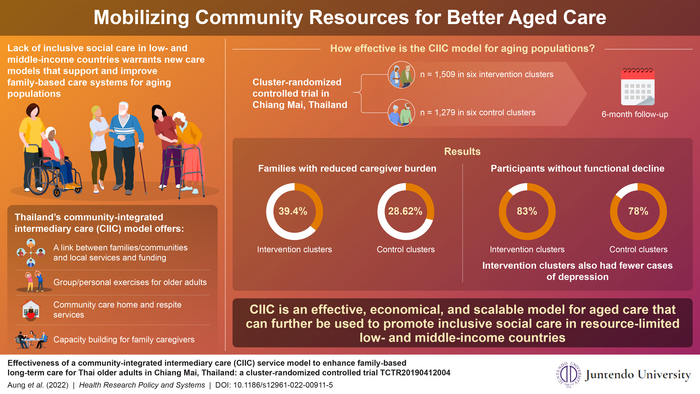In several poorer countries, ageing populations and a lack of universal access to long-term care place the burden of care for older adults on their family. To mitigate this, researchers have successfully implemented a community-integrated intermediary care model in Thailand. This care service has proven effective in reducing caregiver burden and improving the functional ability and independence of seniors. The multi-pronged model includes care prevention activities, capacity-building for family caregivers, and community respite services.

Credit: Juntendo University
In several poorer countries, ageing populations and a lack of universal access to long-term care place the burden of care for older adults on their family. To mitigate this, researchers have successfully implemented a community-integrated intermediary care model in Thailand. This care service has proven effective in reducing caregiver burden and improving the functional ability and independence of seniors. The multi-pronged model includes care prevention activities, capacity-building for family caregivers, and community respite services.
Rapidly ageing populations are a problem that many low- and middle-income countries are currently facing. However, for several of these countries, inclusive health and social care is still a pipeline dream. Since older adults require constant attention and monitoring due to age-related morbidities and disabilities, the onus of caring for them usually falls on their families. This often leads to caregiver stress, burnout, loss of working hours, or job loss. Given this increasing burden on family caregivers, it is essential to come up with new approaches to support and strengthen family-based care systems.
To this end, a multi-national group of researchers from Chiang Mai Rajabhat University, Thailand; Tokyo Ariake University of Medical and Health Sciences, Japan; Ministry of Public Health, Thailand; Chulalongkorn University, Thailand; and Juntendo University, Japan have collaboratively proposed a new prevention-based, community-integrated care model that is specially adapted for improving health and social care services in Association of Southeast Asian Nations (ASEAN) countries. The community-integrated intermediary care (CIIC) model is a novel approach for improving access to long-term care service for the aging population. It recruits community services to offer support to the older people, taking some load off of family caregivers. The model was implemented in Chiang Mai, Thailand and its effectiveness was tested through a cluster-randomized controlled trial funded by the World Health Organization Centre for Health Development (WHO Kobe Centre). The results of this trial are collated in a study which was published in Health Research Policy and Systems on 29 November 2022.
A total of 2,788 participants—1,509 in CIIC intervention clusters and 1,279 in control clusters (that had traditional family-based care), were recruited for the trial. The study investigated the effectiveness of the CIIC model in reducing the burden on family caregivers and improving older people’s functional ability and quality of life. The CIIC model combines formal and informal care that can be implemented at a community, district, subdistrict, or city level. It is designed to improve the link between families and communities, and local formal health services and funding by using a multi-tiered collaborative approach. “The CIIC model includes older persons, their families, peer groups, volunteers, community stakeholders, local governments, primary healthcare centers, and public health departments and ministries in Thailand, for more streamlined resource mobilization and sustainable finance,” explains Prof. Myo Nyein Aung from Juntendo University, Japan, the lead researcher of the trial.
The CIIC intervention included three components. The first was encouraging community group exercises and home exercises to preserve the functional ability of the older persons and reduce their care needs and frailty; the second was the delivery of technical training and assistance for family caregivers to improve their care capacity; and the third component was the provision of formal care through a community-level, short-term respite care service center for dependent elders when their family caregivers are temporarily unavailable.
At a 6-month follow-up, it was found that more families showed reduced caregiver burden in the intervention clusters (mean = 39.4%) than control clusters (mean = 28.62%). Similarly, there were more participants in the intervention clusters (mean = 83% and 87.14%) than the control clusters (mean = 78% and 85.89%) without functional decline and depression, respectively.
These results clearly indicate the effectiveness of the CIIC model in preventing an increase in long-term care needs by improving the physical and mental capacities of elders and in reducing the burden of family caregivers through adequate support. Overall, the model enables healthy aging communities. “CIIC is a cost-effective care model that can be scaled up to help actualize universal long-term care coverage, particularly for the aging populations across different countries in Asia, as well as globally. Furthermore, it could play a key role in bettering health and social welfare policies,” envisions Prof. Aung.
The CIIC model offers a promising solution to an urgent problem—securing access to health and social care for the older persons and providing the basic resources necessary for a life of meaning and dignity.
Journal
Health Research Policy and Systems
DOI
10.1186/s12961-022-00911-5
Method of Research
Observational study
Subject of Research
People
Article Title
Effectiveness of a community-integrated intermediary care (CIIC) service model to enhance family-based long-term care for Thai older adults in Chiang Mai, Thailand: a cluster-randomized controlled trial TCTR20190412004
Article Publication Date
29-Nov-2022




